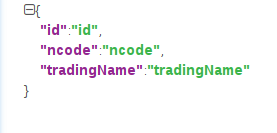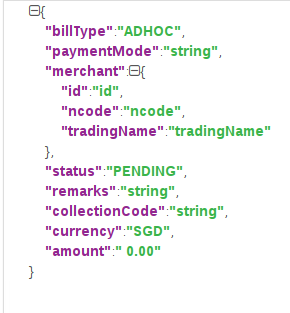volley用法之 以post方式发送 json 参数
需求是这样
我们需要发送一个post请求向服务器要参数。要求是发送的post参数也要是json格式。
简单一点的是这样的:

如果要发送的是这样简单的json格式,我们可以简单的使用map来实现:

RequestQueue requestQueue = Volley.newRequestQueue(getApplicationContext()); Map<String, String> merchant = new HashMap<String, String>(); merchant.put("id", "id"); merchant.put("ncode", "ncode"); merchant.put("tradingName", "tradingName"); Log.d("map", map.toString()); JSONObject jsonObject = new JSONObject(merchant); Log.e(TAG, "getdata: " + jsonObject.toString()); JsonRequest<JSONObject> jsonRequest = new JsonObjectRequest(Request.Method.POST, "", jsonObject, new Response.Listener<JSONObject>() { @Override public void onResponse(JSONObject response) { Log.d(TAG, "response -> " + response.toString()); } }, new Response.ErrorListener() { @Override public void onErrorResponse(VolleyError error) { Log.e(TAG, error.getMessage(), error); } }) { @Override public Map<String, String> getHeaders() { HashMap<String, String> headers = new HashMap<String, String>(); headers.put("Accept", "application/json"); headers.put("Content-Type", "application/json; charset=UTF-8"); return headers; } }; requestQueue.add(jsonRequest); }
这里主要用到的就是
JSONObject jsonObject = new JSONObject(map);
这个方法,可以很方便的将map转成json数据。
如果需要传的是个有嵌套的json数据又该怎么办呢?
例如:

相比之前的数据,我们看到 merchant 也是一个json Object
这种嵌套的格式该怎么写呢?也很简单这里是嵌套,我们也写一个map的嵌套
就好啦!

RequestQueue requestQueue = Volley.newRequestQueue(getApplicationContext()); Map<String, String> merchant = new HashMap<String, String>(); merchant.put("id", "id"); merchant.put("ncode", "ncode"); merchant.put("tradingName", "tradingName"); Map<String, Object> map = new HashMap<>(); map.put("billType", "ADHOC"); map.put("collectionCode", "string"); map.put("otherRefNo", "string"); map.put("contactMode", "SMS"); map.put("merchant", merchant); map.put("currency", "SGD"); map.put("amount", " 0.00"); Log.d("map", map.toString()); JSONObject jsonObject = new JSONObject(map); //后面一样的,省略。
这样再使用 JSONObject 的方法就可以生成我们想要的json格式啦!很简单是吧。
下面来说下JsonRequest的参数:
参数一:
请求方式 (这里是post)
参数二:
请求的URL
参数三:
请求的参数(如果是get请求方式则为空 null)
参数四:
服务器相应的回调(可以根据服务器的相应码区分不同的情况)
参数五:
服务器未响应的回调(可以做一些简单的提示)
谢谢阅读!




 浙公网安备 33010602011771号
浙公网安备 33010602011771号